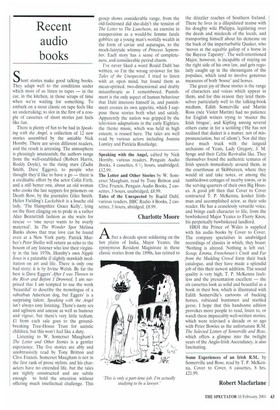Recent audio books
Short stories make good talking books. They adapt well to the conditions under which most of us listen to tapes — in the car, in the kitchen, in those scraps of time when we're waiting for something. To embark on a stout classic on tape feels like an undertaking; to slot in the first of a couple of cassettes of short stories just feels like fun.
There is plenty of fun to be had in Speaking with the Angel, a collection of 12 new stories assembled by the amiable Nick Hornby. There are seven different readers, and the result is arresting. The atmosphere is pleasingly amateurish; the authors range from the well-established (Robert Harris, Roddy Doyle), to the rising stars (Zadie Smith, Dave Eggers), to people who thought they'd like to have a go — there is a creditable effort by the actor Colin Firth, and a still better one, about an old woman who cooks the last suppers for prisoners on Death Row, by the journalist Giles Smith. Helen Fielding's Luckybitch is a louche old lady, 'The Hampshire Grace Kelly', lying on the floor clinging on to pride in a rather Alan Bennettish fashion as she waits for rescue — 'one never wants to be overly maternal'. In The Wonder Spot Melissa Banks shows that true love can be found even at a New York party. Patrick Marbef s Peter Shelley will return an echo to the bosom of any listener who lost their virginity in the late 1970s. Hornby's own Nipple Jesus is a palatable if slightly mawkish meditation on art and life. There is only one bad story; it is by Irvine Welsh. By far the best is Dave Eggers' After I was Thrown in the River and Before I Drowned. I am surprised that I am tempted to use the work 'beautiful' to describe the monologue of a suburban American dog, but Eggers' is a surprising talent. Speaking with the Angel isn't always easy listening. There's nasty sex and ugliness and unease as well as humour and vigour, but there's very little tedium. £1 from each sale goes to the groundbreaking Tree-House Trust for autistic children, but this won't feel like a duty.
Listening to W. Somerset Maugham's The Letter and Other Stories is a gentler experience. The five stories are ably and unobtrusively read by Tony Britton and Clive Francis. Somerset Maugham is not in the first rank of prose stylists, and his characters have no extended life, but the tales are tightly constructed and are subtle enough to hold the attention without offering much intellectual challenge. This group shows considerable range, from the old-fashioned did she-didn't she tension of The Letter to The Luncheon, an exercise in exasperation as a would-be femme fatale gobbles up a young man's worldly wealth in the form of caviar and asparagus, to the mock-fairytale whimsy of Princess September. Each story has a sense of completeness, and considerable period charm.
I've never liked a word Roald Dahl has written. so I'm the wrong reviewer for his Tales of the Unexpected. I tried to listen with an open mind, but found them as mean-spirited, two-dimensional and drably misanthropic as I remembered. Punishment is the only aspect of human behaviour that Dahl interests himself in, and punishment creates its own appetite, which I suppose these stories both whet and satisfy. Apparently the nation was gripped by the television adaptations in the early Eighties: the theme music, which was held in high esteem, is reused here. The tales are well read by various actors including Joanna Lumley and Patricia Routledge.
Speaking with the Angel, edited by Nick Hornby, various readers, Penguin Audio Books, 4 cassettes, 6 1/, hours, unabridged, £12.99.
The Letter and Other Stories by W. Somerset Maug,ham, read by Tony Britton and Clive Francis, Penguin Audio Books, 2 cassettes, 3 hours, unabridged, £8.99.
Tales of the Unexpected by Ro,ald Dahl, various readers. BBC Radio 4 Books, 2 cassettes, 3 hours, abridged. £8.99.
Charlotte Moore


































































 Previous page
Previous page